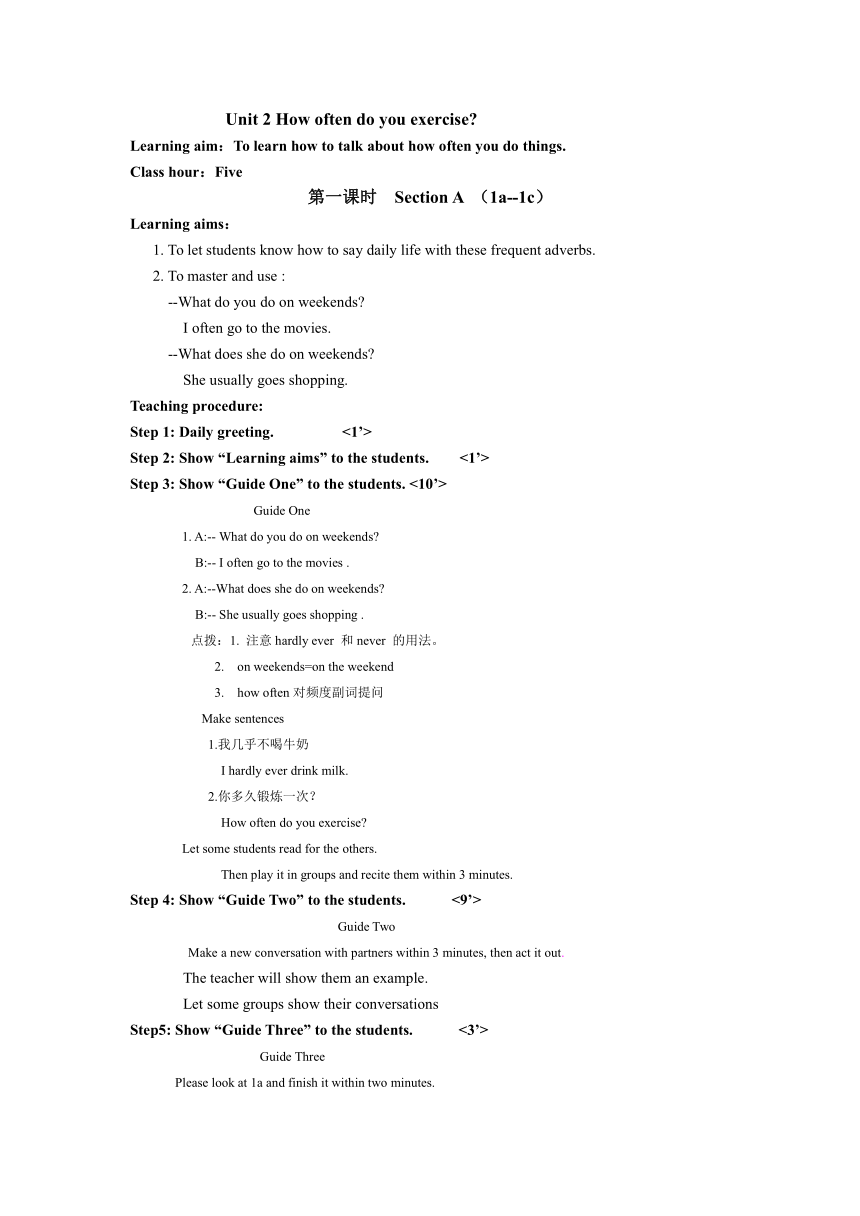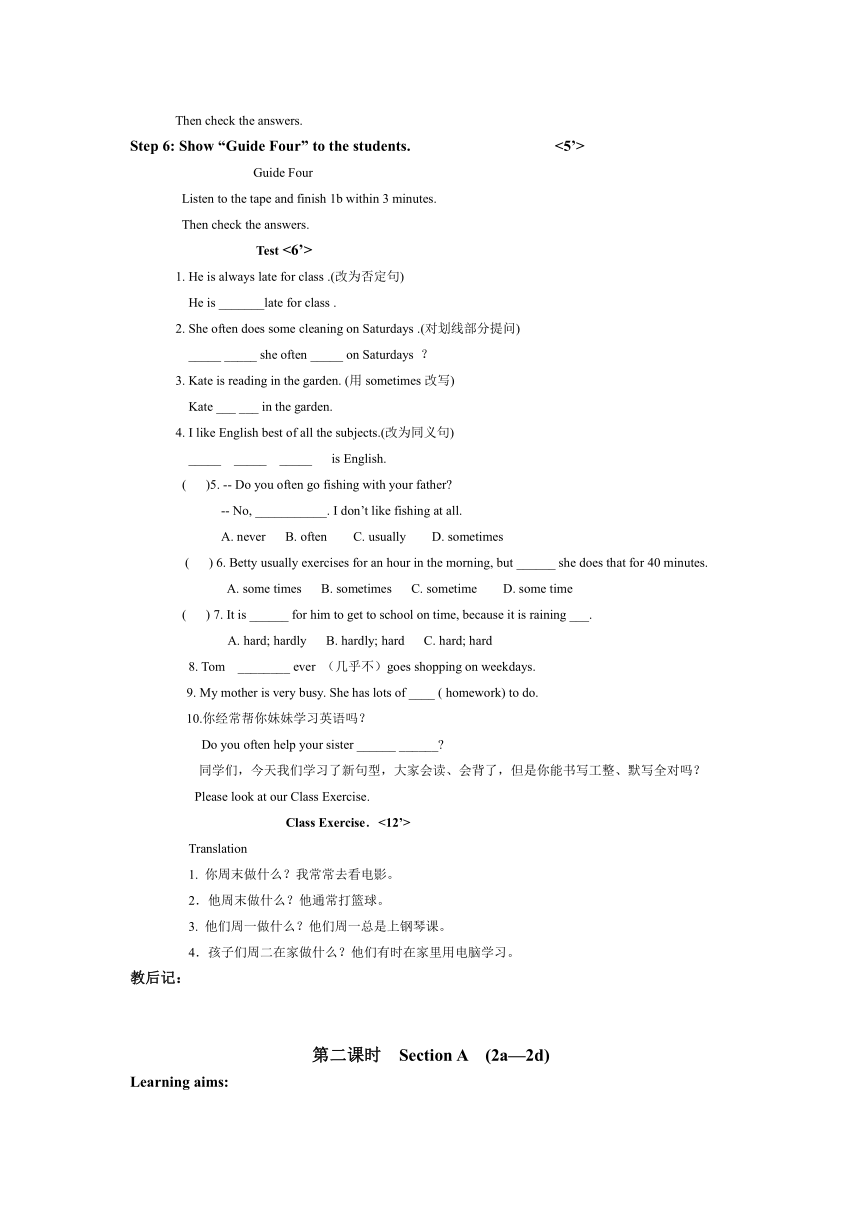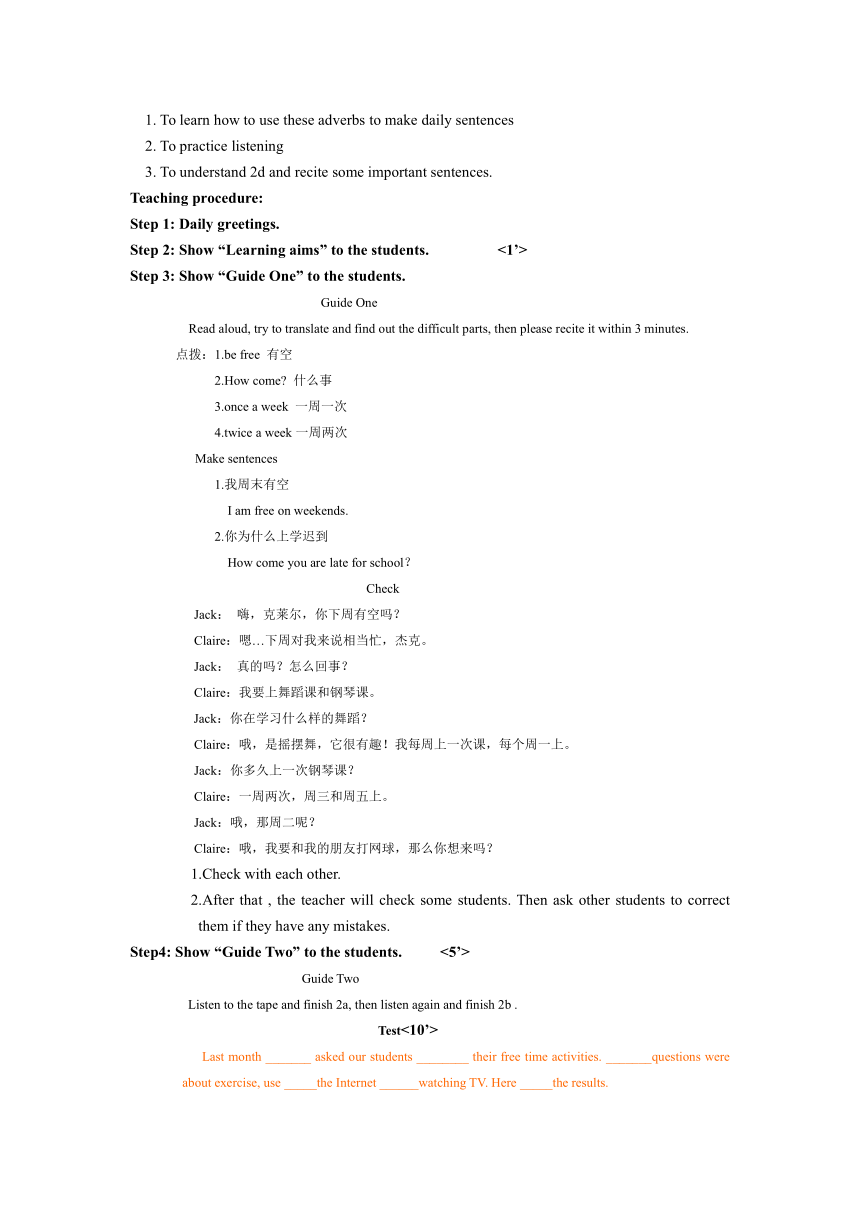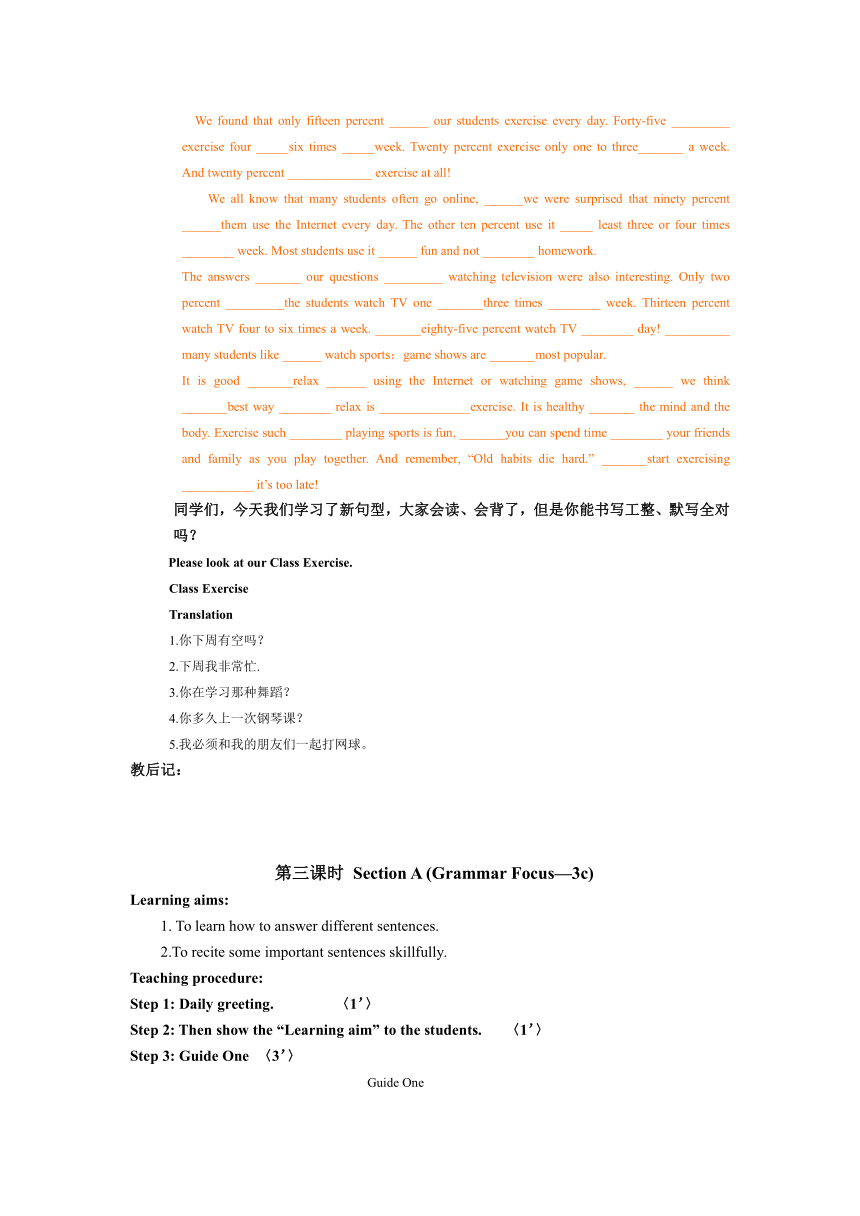2021-2022学年人教版八年级上册Unit 2 How often do you exercise?学案 (5课时)
文档属性
| 名称 | 2021-2022学年人教版八年级上册Unit 2 How often do you exercise?学案 (5课时) |  | |
| 格式 | docx | ||
| 文件大小 | 24.1KB | ||
| 资源类型 | 教案 | ||
| 版本资源 | 人教新目标(Go for it)版 | ||
| 科目 | 英语 | ||
| 更新时间 | 2021-10-04 17:00:27 | ||
图片预览




文档简介
Unit
2
How
often
do
you
exercise
Learning
aim:To
learn
how
to
talk
about
how
often
you
do
things.
Class
hour:Five
第一课时
Section
A
(1a--1c)
Learning
aims:
1.
To
let
students
know
how
to
say
daily
life
with
these
frequent
adverbs.
2.
To
master
and
use
:
--What
do
you
do
on
weekends
I
often
go
to
the
movies.
--What
does
she
do
on
weekends
She
usually
goes
shopping.
Teaching
procedure:
Step
1:
Daily
greeting.
<1’>
Step
2:
Show
“Learning
aims”
to
the
students.
<1’>
Step
3:
Show
“Guide
One”
to
the
students.
<10’>
Guide
One
1.
A:--
What
do
you
do
on
weekends
B:--
I
often
go
to
the
movies
.
2.
A:--What
does
she
do
on
weekends
B:--
She
usually
goes
shopping
.
点拨:1.
注意hardly
ever
和never
的用法。
2.
on
weekends=on
the
weekend
3.
how
often对频度副词提问
Make
sentences
1.我几乎不喝牛奶
I
hardly
ever
drink
milk.
2.你多久锻炼一次?
How
often
do
you
exercise
Let
some
students
read
for
the
others.
Then
play
it
in
groups
and
recite
them
within
3
minutes.
Step
4:
Show
“Guide
Two”
to
the
students.
<9’>
Guide
Two
Make
a
new
conversation
with
partners
within
3
minutes,
then
act
it
out.
The
teacher
will
show
them
an
example.
Let
some
groups
show
their
conversations
Step5:
Show
“Guide
Three”
to
the
students.
<3’>
Guide
Three
Please
look
at
1a
and
finish
it
within
two
minutes.
Then
check
the
answers.
Step
6:
Show
“Guide
Four”
to
the
students.
<5’>
Guide
Four
Listen
to
the
tape
and
finish
1b
within
3
minutes.
Then
check
the
answers.
Test
<6’>
1.
He
is
always
late
for
class
.(改为否定句)
He
is
_______late
for
class
.
2.
She
often
does
some
cleaning
on
Saturdays
.(对划线部分提问)
_____
_____
she
often
_____
on
Saturdays
?
3.
Kate
is
reading
in
the
garden.
(用sometimes改写)
Kate
___
___
in
the
garden.
4.
I
like
English
best
of
all
the
subjects.(改为同义句)
_____
_____
_____
is
English.
(
)5.
--
Do
you
often
go
fishing
with
your
father
--
No,
___________.
I
don’t
like
fishing
at
all.
A.
never
B.
often
C.
usually
D.
sometimes
(
)
6.
Betty
usually
exercises
for
an
hour
in
the
morning,
but
______
she
does
that
for
40
minutes.
A.
some
times
B.
sometimes
C.
sometime
D.
some
time
(
)
7.
It
is
______
for
him
to
get
to
school
on
time,
because
it
is
raining
___.
A.
hard;
hardly
B.
hardly;
hard
C.
hard;
hard
8.
Tom
________
ever
(几乎不)goes
shopping
on
weekdays.
9.
My
mother
is
very
busy.
She
has
lots
of
____
(
homework)
to
do.
10.你经常帮你妹妹学习英语吗?
Do
you
often
help
your
sister
______
______
同学们,今天我们学习了新句型,大家会读、会背了,但是你能书写工整、默写全对吗?
Please
look
at
our
Class
Exercise.
Class
Exercise.<12’>
Translation
1.
你周末做什么?我常常去看电影。
2.他周末做什么?他通常打篮球。
3.
他们周一做什么?他们周一总是上钢琴课。
4.孩子们周二在家做什么?他们有时在家里用电脑学习。
教后记:
第二课时
Section
A
(2a—2d)
Learning
aims:
1.
To
learn
how
to
use
these
adverbs
to
make
daily
sentences
2.
To
practice
listening
3.
To
understand
2d
and
recite
some
important
sentences.
Teaching
procedure:
Step
1:
Daily
greetings.
Step
2:
Show
“Learning
aims”
to
the
students.
<1’>
Step
3:
Show
“Guide
One”
to
the
students.
Guide
One
Read
aloud,
try
to
translate
and
find
out
the
difficult
parts,
then
please
recite
it
within
3
minutes.
点拨:1.be
free
有空
2.How
come
什么事
3.once
a
week
一周一次
4.twice
a
week一周两次
Make
sentences
1.我周末有空
I
am
free
on
weekends.
2.你为什么上学迟到
How
come
you
are
late
for
school?
Check
Jack:
嗨,克莱尔,你下周有空吗?
Claire:嗯…下周对我来说相当忙,杰克。
Jack:
真的吗?怎么回事?
Claire:我要上舞蹈课和钢琴课。
Jack:你在学习什么样的舞蹈?
Claire:哦,是摇摆舞,它很有趣!我每周上一次课,每个周一上。
Jack:你多久上一次钢琴课?
Claire:一周两次,周三和周五上。
Jack:哦,那周二呢?
Claire:哦,我要和我的朋友打网球,那么你想来吗?
1.Check
with
each
other.
2.After
that
,
the
teacher
will
check
some
students.
Then
ask
other
students
to
correct
them
if
they
have
any
mistakes.
Step4:
Show
“Guide
Two”
to
the
students.
<5’>
Guide
Two
Listen
to
the
tape
and
finish
2a,
then
listen
again
and
finish
2b
.
Test<10’>
Last
month
_______
asked
our
students
________
their
free
time
activities.
_______questions
were
about
exercise,
use
_____the
Internet
______watching
TV.
Here
_____the
results.
We
found
that
only
fifteen
percent
______
our
students
exercise
every
day.
Forty-five
_________
exercise
four
_____six
times
_____week.
Twenty
percent
exercise
only
one
to
three_______
a
week.
And
twenty
percent
_____________
exercise
at
all!
We
all
know
that
many
students
often
go
online,
______we
were
surprised
that
ninety
percent
______them
use
the
Internet
every
day.
The
other
ten
percent
use
it
_____
least
three
or
four
times
________
week.
Most
students
use
it
______
fun
and
not
________
homework.
The
answers
_______
our
questions
_________
watching
television
were
also
interesting.
Only
two
percent
_________the
students
watch
TV
one
_______three
times
________
week.
Thirteen
percent
watch
TV
four
to
six
times
a
week.
_______eighty-five
percent
watch
TV
________
day!
__________
many
students
like
______
watch
sports;game
shows
are
_______most
popular.
It
is
good
_______relax
______
using
the
Internet
or
watching
game
shows,
______
we
think
_______best
way
________
relax
is
______________exercise.
It
is
healthy
_______
the
mind
and
the
body.
Exercise
such
________
playing
sports
is
fun,
_______you
can
spend
time
________
your
friends
and
family
as
you
play
together.
And
remember,
“Old
habits
die
hard.”
_______start
exercising
___________
it’s
too
late!
同学们,今天我们学习了新句型,大家会读、会背了,但是你能书写工整、默写全对吗?
Please
look
at
our
Class
Exercise.
Class
Exercise
Translation
1.你下周有空吗?
2.下周我非常忙.
3.你在学习那种舞蹈?
4.你多久上一次钢琴课?
5.我必须和我的朋友们一起打网球。
教后记:
第三课时
Section
A
(Grammar
Focus—3c)
Learning
aims:
1.
To
learn
how
to
answer
different
sentences.
2.To
recite
some
important
sentences
skillfully.
Teaching
procedure:
Step
1:
Daily
greeting.
〈1’〉
Step
2:
Then
show
the
“Learning
aim”
to
the
students.
〈1’〉
Step
3:
Guide
One
〈3’〉
Guide
One
Please
read
and
translate
the
Grammar
focus,
then
recite
it
within
3
minutes..(Read
the
guide
to
the
students
slowly.)
Step
4:
Show
Guide
Two
to
the
students.
〈3’〉
Guide
Two
Look
at
3a
and
finish
it
within
2
minutes.
(Read
the
guide
to
the
students
slowly.)
Step
5:
Show
Guide
Three
to
students.
〈3’〉
Guide
Three
Look
at
3b
and
finish
it
within
3
minutes.
(Read
the
guide
to
the
students
slowly.)
Test
<5’>
1.
We
often
go
______(swim)
in
the
afternoon
is
summer.
2.
Vegetables
are
______(health)
food.
3.
他们通常一周熬夜三次。
They
usually
______
______
three
times
a
week.
4.快速地吃完早餐后,我不得不跑去学校。
After
______
______
______
,I
______
______
run
to
school.
(
)5.
Lucy
isn’t
at
home._______
she
is
at
school.
A.
May
B.
May
be
C.
Maybe
D.
Can
(
)6.
_______
do
you
water
the
tree
---Once
a
week.
A.
How
often
B.
How
long
C.
How
soon
D.
How
much
(
)7.
My
sister
always
goes
to
work
on
time
and
she
is
______
late.
A.
hardly
ever
B.
usually
C.
sometimes
D.
ever
(
)8.
Tina
does
______
homework
______
.
A.
everyday;
everyday
B.
everyday;
every
day
C.
every
day;
every
day
D.
every
day;
everyday
(
)9.
–Is
this
blue
bag
yours
--
No.
______
it
is
______.
She
has
a
blue
bag.
A.
Maybe;
Jane’s
B.
May
be;
JaneC.
Maybe;
Jane
D.
May
be;
Jane’s
(
)10.
The
model
plane
isn’t
as
nice
as
my
friend’s,
but
__
it
was
made
by
myself.
A.
at
least
B.
at
last
C.
at
times
D.
at
present
同学们,今天我们学习了新句型,大家会读、会背了,但是你能书写工整、默写全对吗?
Please
look
at
our
Class
Exercise.
Class
Exercise
Translation.
1.你通常在周末做什么?我总是锻炼。
2.他们通常在周末做什么?他们经常帮忙家务。
3.她通常在周末做什么?她有时购物。
4.你多久看一次电影?我或许一个月看一次电影。
5.他多久看一次电视?他几乎不看电视。
6.你购物吗?不,
我从不购物。
教后记:
第四课时
Section
B
(1a—1d)
Learning
aims:
1.
To
improve
listening
skills.
2.
To
recite
some
important
sentences
skillfully.
Teaching
procedure:
Step
1:
Daily
greetings.
Step2:
Show
the
“Learning
aims”
to
the
students.
<1’>
Step3:Show
“Guide
One”
to
the
students
<5’>
Guide
One
Read
the
following
sentences,
then
recite
it
within
5
minutes.
1.Let’s
start
with
the
first
question.
2.How
many
hours
do
you
sleep
every
night
3.How
often
do
you
drink
milk
4.I
guess
I
eat
it
two
or
three
times
a
week.
5.I
can’t
stand
milk.
Let
some
students
read
for
the
others.
Then
play
it
in
groups
and
recite
them
within
5
minutes....
Check
with
each
other.
Then
check
some
students.
点拨:1.be
good
for/at/to/with......
2.every
day
(adj.)每天的,日常的
everyday
(adv.)每日
Make
sentences
1.我擅长写作/和老人相处
I
am
good
at
writing/with
old
people.
2.我每天早上都早起
I
get
up
early
every
day.
Check
1.让我们开始第一个问题。
2.每晚你睡几个小时。
3.你多久喝一次奶?
4.我想我一周喝两到三次。
5.我受不了牛奶。
Step
4:
Show
“Guide
Two”
to
the
students.
<2’>
Guide
Two
Listen
to
the
tape
and
finish
1c,
1d.
1.Then
check
the
answer.
2.
Listen
and
repeat
the
conversations.
点拨:1.start
with
以……开始
2.can’t
stand无法忍受
3.three
times
a
week一周三次
Step
5:
Show
“Guide
Three”
to
the
students.
<8’>
Guide
Three
Please
make
a
new
conversation
with
your
partners
within
3
minutes,
then
act
it
out.
Test
<5’>
用所给词的词适当形式填空。
usually,
often,
hardly-ever,
never,
sometimes,
I
am
Tina.
I
___
___exercise.
Because
I
don’t
like
doing
sports.
But
I
____
eat
vegetables.
And
I
______
eat
ice-creams,
because
it
tastes
really
delicious.
I____
stay
up
late,
because
I
know
it
is
bad
for
my
health.
I
_____
get
up
early.
同学们,今天我们学习了新句型,大家会读、会背了,但是你能书写工整、默写全对吗?
Please
look
at
our
Class
Exercise.
Class
Exercise
<10’>
Translation.
1.你多久锻炼一次?我每天锻炼。
2.他多久吃一次蔬菜?他三天吃一次蔬菜。
3.他们多久吃一次水果?他们一周吃一次水果。
4.你每天晚上睡几个小时?八个小时。
5.她多久喝一次咖啡 她从不喝咖啡。
教后记:
第五课时
Section
B
(2b)
Learning
aims:
1.To
improve
your
reading
skills.
2.
To
learn
and
understand
2b
3.
To
recite
some
important
sentences.
Teaching
procedure:
Step
1:
Daily
greetings.
<3’>
Step
2:
Show
the
“Learning
aims”
to
the
students.
<3’>
Step
3:
Show
“Guide
One”
to
the
students.
<5’>
Guide
One
Read
2b
aloud
and
answer
the
following
questions.
1.
How
many
percent
of
the
students
do
not
exercise
at
all
2.
How
many
percent
of
the
students
use
the
Internet
every
day
3.
How
often
do
most
students
watch
TV
What
do
they
usually
watch
4.
What
does
the
writer
think
is
the
best
way
to
relax
Why
5.
Do
you
think
the
students
at
NO.5
are
healthy
Why
or
why
not
Give
students
3
minutes
to
finish
it
by
themselves.
Then
ask
the
students
to
answer
the
questions
one
by
one.
Then
check
the
answers.
Step4:
Show
“Guide
Two”
to
the
students.
<3’>
Guide
Two
Read
2b
again
and
find
out
difficult
points.
Then
discuss
in
groups.
Step5:
Show
“Guide
Three”
to
the
students.
<5’>
Guide
Three
Discuss
in
groups
.
If
you
need
my
help
,
please
hands
up
.
Help
them
if
necessary.
点拨:
1.ask
sb.
about
sth.
问某人关于某事
2.
基数词+percent
3.
use
sth
for
fun
and
not
for
sth
4.
the
answers
to
questions
about
sth
5.
it’s
good
to
do
by
doing
sth
Then
listen
to
the
tape
and
repeat
the
article.
Make
sentences
1.我询问我的老师关于我的成绩
I
ask
my
teacher
about
my
grades.
2.百分之五十的学生可以得到A的英语成绩
50
percent
of
the
students
can
get
A
in
English.
3.阅读大声可以对学习英语有好处
It
is
good
to
study
English
by
reading
aloud.
Step6:
Show
“Guide
Four”
to
the
students.
<4’>
Guide
Four
Please
finish
2d
within
4
minutes.
Have
a
match
and
see
who
can
get
full
marks
Test<6’>
Jane
is
_______16-year-old
high
school
student
_______the
United
States.
American
Teenager
magazine
asked
_______
about
her
habits.
Jane
has
_______
lot
_____good
habits.
She
always
exercises
________she
reads
books
________day
.
Also,
she
often
drinks
juice
and
she
hardly
_________stays
up
late.
___________,
she
has
some
bad
habits,
too.
She
usually
watches
TV
_________more
than
two
hours
_________day,
and
________
sometimes
eats
hamburgers.
__________parents
are
not
very
happy
___________
she
hardly
ever
helps
________
housework
and
she
never
goes
________the
dentist
_______
teeth
cleaning.
She
says
she
is
afraid!
同学们,今天我们学习了新句型,大家会读、会背了,但是你能书写工整、默写全对吗?
Please
look
at
our
Class
Exercise.
Class
Exercise
<10’>
Translation.
1.我们的问题涉及锻炼,上网和看电视。
2.百分之四十五的学生一周锻炼四次
3.大多数学生上网只是为了玩乐而不是做作业。
4.尽管许多学生喜欢看体育节目但是竞赛节目是最受欢迎的。
5.锻炼对身心都有好处。
教后记
2
How
often
do
you
exercise
Learning
aim:To
learn
how
to
talk
about
how
often
you
do
things.
Class
hour:Five
第一课时
Section
A
(1a--1c)
Learning
aims:
1.
To
let
students
know
how
to
say
daily
life
with
these
frequent
adverbs.
2.
To
master
and
use
:
--What
do
you
do
on
weekends
I
often
go
to
the
movies.
--What
does
she
do
on
weekends
She
usually
goes
shopping.
Teaching
procedure:
Step
1:
Daily
greeting.
<1’>
Step
2:
Show
“Learning
aims”
to
the
students.
<1’>
Step
3:
Show
“Guide
One”
to
the
students.
<10’>
Guide
One
1.
A:--
What
do
you
do
on
weekends
B:--
I
often
go
to
the
movies
.
2.
A:--What
does
she
do
on
weekends
B:--
She
usually
goes
shopping
.
点拨:1.
注意hardly
ever
和never
的用法。
2.
on
weekends=on
the
weekend
3.
how
often对频度副词提问
Make
sentences
1.我几乎不喝牛奶
I
hardly
ever
drink
milk.
2.你多久锻炼一次?
How
often
do
you
exercise
Let
some
students
read
for
the
others.
Then
play
it
in
groups
and
recite
them
within
3
minutes.
Step
4:
Show
“Guide
Two”
to
the
students.
<9’>
Guide
Two
Make
a
new
conversation
with
partners
within
3
minutes,
then
act
it
out.
The
teacher
will
show
them
an
example.
Let
some
groups
show
their
conversations
Step5:
Show
“Guide
Three”
to
the
students.
<3’>
Guide
Three
Please
look
at
1a
and
finish
it
within
two
minutes.
Then
check
the
answers.
Step
6:
Show
“Guide
Four”
to
the
students.
<5’>
Guide
Four
Listen
to
the
tape
and
finish
1b
within
3
minutes.
Then
check
the
answers.
Test
<6’>
1.
He
is
always
late
for
class
.(改为否定句)
He
is
_______late
for
class
.
2.
She
often
does
some
cleaning
on
Saturdays
.(对划线部分提问)
_____
_____
she
often
_____
on
Saturdays
?
3.
Kate
is
reading
in
the
garden.
(用sometimes改写)
Kate
___
___
in
the
garden.
4.
I
like
English
best
of
all
the
subjects.(改为同义句)
_____
_____
_____
is
English.
(
)5.
--
Do
you
often
go
fishing
with
your
father
--
No,
___________.
I
don’t
like
fishing
at
all.
A.
never
B.
often
C.
usually
D.
sometimes
(
)
6.
Betty
usually
exercises
for
an
hour
in
the
morning,
but
______
she
does
that
for
40
minutes.
A.
some
times
B.
sometimes
C.
sometime
D.
some
time
(
)
7.
It
is
______
for
him
to
get
to
school
on
time,
because
it
is
raining
___.
A.
hard;
hardly
B.
hardly;
hard
C.
hard;
hard
8.
Tom
________
ever
(几乎不)goes
shopping
on
weekdays.
9.
My
mother
is
very
busy.
She
has
lots
of
____
(
homework)
to
do.
10.你经常帮你妹妹学习英语吗?
Do
you
often
help
your
sister
______
______
同学们,今天我们学习了新句型,大家会读、会背了,但是你能书写工整、默写全对吗?
Please
look
at
our
Class
Exercise.
Class
Exercise.<12’>
Translation
1.
你周末做什么?我常常去看电影。
2.他周末做什么?他通常打篮球。
3.
他们周一做什么?他们周一总是上钢琴课。
4.孩子们周二在家做什么?他们有时在家里用电脑学习。
教后记:
第二课时
Section
A
(2a—2d)
Learning
aims:
1.
To
learn
how
to
use
these
adverbs
to
make
daily
sentences
2.
To
practice
listening
3.
To
understand
2d
and
recite
some
important
sentences.
Teaching
procedure:
Step
1:
Daily
greetings.
Step
2:
Show
“Learning
aims”
to
the
students.
<1’>
Step
3:
Show
“Guide
One”
to
the
students.
Guide
One
Read
aloud,
try
to
translate
and
find
out
the
difficult
parts,
then
please
recite
it
within
3
minutes.
点拨:1.be
free
有空
2.How
come
什么事
3.once
a
week
一周一次
4.twice
a
week一周两次
Make
sentences
1.我周末有空
I
am
free
on
weekends.
2.你为什么上学迟到
How
come
you
are
late
for
school?
Check
Jack:
嗨,克莱尔,你下周有空吗?
Claire:嗯…下周对我来说相当忙,杰克。
Jack:
真的吗?怎么回事?
Claire:我要上舞蹈课和钢琴课。
Jack:你在学习什么样的舞蹈?
Claire:哦,是摇摆舞,它很有趣!我每周上一次课,每个周一上。
Jack:你多久上一次钢琴课?
Claire:一周两次,周三和周五上。
Jack:哦,那周二呢?
Claire:哦,我要和我的朋友打网球,那么你想来吗?
1.Check
with
each
other.
2.After
that
,
the
teacher
will
check
some
students.
Then
ask
other
students
to
correct
them
if
they
have
any
mistakes.
Step4:
Show
“Guide
Two”
to
the
students.
<5’>
Guide
Two
Listen
to
the
tape
and
finish
2a,
then
listen
again
and
finish
2b
.
Test<10’>
Last
month
_______
asked
our
students
________
their
free
time
activities.
_______questions
were
about
exercise,
use
_____the
Internet
______watching
TV.
Here
_____the
results.
We
found
that
only
fifteen
percent
______
our
students
exercise
every
day.
Forty-five
_________
exercise
four
_____six
times
_____week.
Twenty
percent
exercise
only
one
to
three_______
a
week.
And
twenty
percent
_____________
exercise
at
all!
We
all
know
that
many
students
often
go
online,
______we
were
surprised
that
ninety
percent
______them
use
the
Internet
every
day.
The
other
ten
percent
use
it
_____
least
three
or
four
times
________
week.
Most
students
use
it
______
fun
and
not
________
homework.
The
answers
_______
our
questions
_________
watching
television
were
also
interesting.
Only
two
percent
_________the
students
watch
TV
one
_______three
times
________
week.
Thirteen
percent
watch
TV
four
to
six
times
a
week.
_______eighty-five
percent
watch
TV
________
day!
__________
many
students
like
______
watch
sports;game
shows
are
_______most
popular.
It
is
good
_______relax
______
using
the
Internet
or
watching
game
shows,
______
we
think
_______best
way
________
relax
is
______________exercise.
It
is
healthy
_______
the
mind
and
the
body.
Exercise
such
________
playing
sports
is
fun,
_______you
can
spend
time
________
your
friends
and
family
as
you
play
together.
And
remember,
“Old
habits
die
hard.”
_______start
exercising
___________
it’s
too
late!
同学们,今天我们学习了新句型,大家会读、会背了,但是你能书写工整、默写全对吗?
Please
look
at
our
Class
Exercise.
Class
Exercise
Translation
1.你下周有空吗?
2.下周我非常忙.
3.你在学习那种舞蹈?
4.你多久上一次钢琴课?
5.我必须和我的朋友们一起打网球。
教后记:
第三课时
Section
A
(Grammar
Focus—3c)
Learning
aims:
1.
To
learn
how
to
answer
different
sentences.
2.To
recite
some
important
sentences
skillfully.
Teaching
procedure:
Step
1:
Daily
greeting.
〈1’〉
Step
2:
Then
show
the
“Learning
aim”
to
the
students.
〈1’〉
Step
3:
Guide
One
〈3’〉
Guide
One
Please
read
and
translate
the
Grammar
focus,
then
recite
it
within
3
minutes..(Read
the
guide
to
the
students
slowly.)
Step
4:
Show
Guide
Two
to
the
students.
〈3’〉
Guide
Two
Look
at
3a
and
finish
it
within
2
minutes.
(Read
the
guide
to
the
students
slowly.)
Step
5:
Show
Guide
Three
to
students.
〈3’〉
Guide
Three
Look
at
3b
and
finish
it
within
3
minutes.
(Read
the
guide
to
the
students
slowly.)
Test
<5’>
1.
We
often
go
______(swim)
in
the
afternoon
is
summer.
2.
Vegetables
are
______(health)
food.
3.
他们通常一周熬夜三次。
They
usually
______
______
three
times
a
week.
4.快速地吃完早餐后,我不得不跑去学校。
After
______
______
______
,I
______
______
run
to
school.
(
)5.
Lucy
isn’t
at
home._______
she
is
at
school.
A.
May
B.
May
be
C.
Maybe
D.
Can
(
)6.
_______
do
you
water
the
tree
---Once
a
week.
A.
How
often
B.
How
long
C.
How
soon
D.
How
much
(
)7.
My
sister
always
goes
to
work
on
time
and
she
is
______
late.
A.
hardly
ever
B.
usually
C.
sometimes
D.
ever
(
)8.
Tina
does
______
homework
______
.
A.
everyday;
everyday
B.
everyday;
every
day
C.
every
day;
every
day
D.
every
day;
everyday
(
)9.
–Is
this
blue
bag
yours
--
No.
______
it
is
______.
She
has
a
blue
bag.
A.
Maybe;
Jane’s
B.
May
be;
JaneC.
Maybe;
Jane
D.
May
be;
Jane’s
(
)10.
The
model
plane
isn’t
as
nice
as
my
friend’s,
but
__
it
was
made
by
myself.
A.
at
least
B.
at
last
C.
at
times
D.
at
present
同学们,今天我们学习了新句型,大家会读、会背了,但是你能书写工整、默写全对吗?
Please
look
at
our
Class
Exercise.
Class
Exercise
Translation.
1.你通常在周末做什么?我总是锻炼。
2.他们通常在周末做什么?他们经常帮忙家务。
3.她通常在周末做什么?她有时购物。
4.你多久看一次电影?我或许一个月看一次电影。
5.他多久看一次电视?他几乎不看电视。
6.你购物吗?不,
我从不购物。
教后记:
第四课时
Section
B
(1a—1d)
Learning
aims:
1.
To
improve
listening
skills.
2.
To
recite
some
important
sentences
skillfully.
Teaching
procedure:
Step
1:
Daily
greetings.
Step2:
Show
the
“Learning
aims”
to
the
students.
<1’>
Step3:Show
“Guide
One”
to
the
students
<5’>
Guide
One
Read
the
following
sentences,
then
recite
it
within
5
minutes.
1.Let’s
start
with
the
first
question.
2.How
many
hours
do
you
sleep
every
night
3.How
often
do
you
drink
milk
4.I
guess
I
eat
it
two
or
three
times
a
week.
5.I
can’t
stand
milk.
Let
some
students
read
for
the
others.
Then
play
it
in
groups
and
recite
them
within
5
minutes....
Check
with
each
other.
Then
check
some
students.
点拨:1.be
good
for/at/to/with......
2.every
day
(adj.)每天的,日常的
everyday
(adv.)每日
Make
sentences
1.我擅长写作/和老人相处
I
am
good
at
writing/with
old
people.
2.我每天早上都早起
I
get
up
early
every
day.
Check
1.让我们开始第一个问题。
2.每晚你睡几个小时。
3.你多久喝一次奶?
4.我想我一周喝两到三次。
5.我受不了牛奶。
Step
4:
Show
“Guide
Two”
to
the
students.
<2’>
Guide
Two
Listen
to
the
tape
and
finish
1c,
1d.
1.Then
check
the
answer.
2.
Listen
and
repeat
the
conversations.
点拨:1.start
with
以……开始
2.can’t
stand无法忍受
3.three
times
a
week一周三次
Step
5:
Show
“Guide
Three”
to
the
students.
<8’>
Guide
Three
Please
make
a
new
conversation
with
your
partners
within
3
minutes,
then
act
it
out.
Test
<5’>
用所给词的词适当形式填空。
usually,
often,
hardly-ever,
never,
sometimes,
I
am
Tina.
I
___
___exercise.
Because
I
don’t
like
doing
sports.
But
I
____
eat
vegetables.
And
I
______
eat
ice-creams,
because
it
tastes
really
delicious.
I____
stay
up
late,
because
I
know
it
is
bad
for
my
health.
I
_____
get
up
early.
同学们,今天我们学习了新句型,大家会读、会背了,但是你能书写工整、默写全对吗?
Please
look
at
our
Class
Exercise.
Class
Exercise
<10’>
Translation.
1.你多久锻炼一次?我每天锻炼。
2.他多久吃一次蔬菜?他三天吃一次蔬菜。
3.他们多久吃一次水果?他们一周吃一次水果。
4.你每天晚上睡几个小时?八个小时。
5.她多久喝一次咖啡 她从不喝咖啡。
教后记:
第五课时
Section
B
(2b)
Learning
aims:
1.To
improve
your
reading
skills.
2.
To
learn
and
understand
2b
3.
To
recite
some
important
sentences.
Teaching
procedure:
Step
1:
Daily
greetings.
<3’>
Step
2:
Show
the
“Learning
aims”
to
the
students.
<3’>
Step
3:
Show
“Guide
One”
to
the
students.
<5’>
Guide
One
Read
2b
aloud
and
answer
the
following
questions.
1.
How
many
percent
of
the
students
do
not
exercise
at
all
2.
How
many
percent
of
the
students
use
the
Internet
every
day
3.
How
often
do
most
students
watch
TV
What
do
they
usually
watch
4.
What
does
the
writer
think
is
the
best
way
to
relax
Why
5.
Do
you
think
the
students
at
NO.5
are
healthy
Why
or
why
not
Give
students
3
minutes
to
finish
it
by
themselves.
Then
ask
the
students
to
answer
the
questions
one
by
one.
Then
check
the
answers.
Step4:
Show
“Guide
Two”
to
the
students.
<3’>
Guide
Two
Read
2b
again
and
find
out
difficult
points.
Then
discuss
in
groups.
Step5:
Show
“Guide
Three”
to
the
students.
<5’>
Guide
Three
Discuss
in
groups
.
If
you
need
my
help
,
please
hands
up
.
Help
them
if
necessary.
点拨:
1.ask
sb.
about
sth.
问某人关于某事
2.
基数词+percent
3.
use
sth
for
fun
and
not
for
sth
4.
the
answers
to
questions
about
sth
5.
it’s
good
to
do
by
doing
sth
Then
listen
to
the
tape
and
repeat
the
article.
Make
sentences
1.我询问我的老师关于我的成绩
I
ask
my
teacher
about
my
grades.
2.百分之五十的学生可以得到A的英语成绩
50
percent
of
the
students
can
get
A
in
English.
3.阅读大声可以对学习英语有好处
It
is
good
to
study
English
by
reading
aloud.
Step6:
Show
“Guide
Four”
to
the
students.
<4’>
Guide
Four
Please
finish
2d
within
4
minutes.
Have
a
match
and
see
who
can
get
full
marks
Test<6’>
Jane
is
_______16-year-old
high
school
student
_______the
United
States.
American
Teenager
magazine
asked
_______
about
her
habits.
Jane
has
_______
lot
_____good
habits.
She
always
exercises
________she
reads
books
________day
.
Also,
she
often
drinks
juice
and
she
hardly
_________stays
up
late.
___________,
she
has
some
bad
habits,
too.
She
usually
watches
TV
_________more
than
two
hours
_________day,
and
________
sometimes
eats
hamburgers.
__________parents
are
not
very
happy
___________
she
hardly
ever
helps
________
housework
and
she
never
goes
________the
dentist
_______
teeth
cleaning.
She
says
she
is
afraid!
同学们,今天我们学习了新句型,大家会读、会背了,但是你能书写工整、默写全对吗?
Please
look
at
our
Class
Exercise.
Class
Exercise
<10’>
Translation.
1.我们的问题涉及锻炼,上网和看电视。
2.百分之四十五的学生一周锻炼四次
3.大多数学生上网只是为了玩乐而不是做作业。
4.尽管许多学生喜欢看体育节目但是竞赛节目是最受欢迎的。
5.锻炼对身心都有好处。
教后记
同课章节目录
- Unit 1 Where did you go on vacation?
- Section A
- Section B
- Unit 2 How often do you exercise?
- Section A
- Section B
- Unit 3 I'm more outgoing than my sister.
- Section A
- Section B
- Unit 4 What's the best movie theater?
- Section A
- Section B
- Unit 5 Do you want to watch a game show?
- Section A
- Section B
- Unit 6 I'm going to study computer science.
- Section A
- Section B
- Unit 7 Will people have robots?
- Section A
- Section B
- Unit 8 How do you make a banana milk shake?
- Section A
- Section B
- Unit 9 Can you come to my party?
- Section A
- Section B
- Unit 10 If you go to the party, you'll have a grea
- Section A
- Section B
